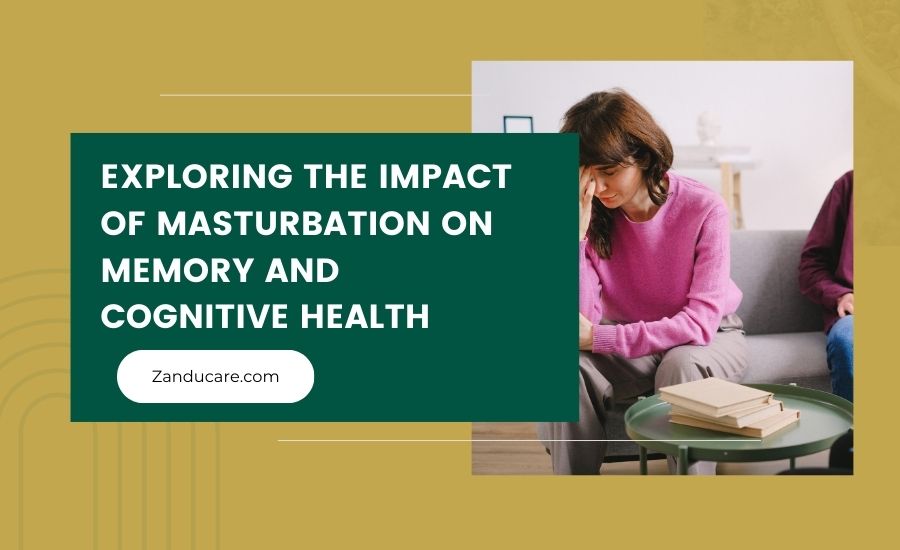
Impact & Effects of Masturbation on Memory and Brain Health
|
Key insights:
|
Masturbation is a natural and widely practised act surrounded by myths and misconceptions for centuries. While often associated with physical pleasure and stress relief, its impact on mental health, particularly memory and brain function, is a topic of growing interest and debate. Many wonder whether this personal activity positively or negatively influences cognitive abilities, focus, and memory retention.
Scientifically, masturbation triggers the release of various hormones like dopamine and oxytocin, which are vital for mood regulation and stress reduction. However, concerns arise when this behavior becomes excessive, potentially leading to issues like mental fatigue or "brain fog."
This article explores the relationship between masturbation and brain health, addressing its effects on memory, dispelling myths, and offering insights into maintaining a healthy balance.
|
Did You Know?
|
Understanding Masturbation and Brain Chemistry

A type of sexual stimulation called masturbation causes the brain to release a series of hormones and neurotransmitters. Dopamine, a neurotransmitter linked to reward and pleasure, is released during the act. This produces sensations of relaxation and happiness. Furthermore, the release of oxytocin, commonly called the "love hormone," contributes to a feeling of well-being.
Physiologically speaking, these substances have a beneficial effect on stress levels and can elevate mood. However, over time, the brain may become desensitized to natural rewards if dopamine is released excessively and repeatedly. It is during this desensitisation that memory and cognitive health issues start to surface.
Does Masturbation Affect Memory?
The hippocampus, a part of the brain that receives and stores information, is largely responsible for memory and cognitive processes. There is no concrete scientific proof that moderate masturbation has a deleterious effect on memory or the hippocampus.
But excessive masturbation, which is frequently associated with obsessive habits, may have an indirect effect on memory. Controlled masturbation may be beneficial to mental health in general, according to research.
- Sleep Disruption: Depending on personal patterns, masturbation can either promote or interfere with sleep. Memory consolidation, a process that takes place during deep sleep, can be hampered by poor sleep brought on by obsessive late-night masturbation.
- Emotional Stress: Although occasional masturbation might help reduce stress, excessive guilt or worry about the act can lead to emotional anguish, which impairs concentration and memory.
- Dopamine Overload: Compulsive masturbation can cause dopamine imbalances over time, which may have an impact on the reward system in the brain. This may have an indirect effect on concentration and memory.
Effects of Masturbation on the Brain

The quick release of hormones during masturbation has several beneficial consequences on the brain, including enhanced mental and physical health, which are discussed below.
1. Dopamine Boost
The 'happy hormone', dopamine, has a role in motivation and reward-seeking. Dopamine release has been shown to increase focus and clarity.
2. Serotonin Elevation
A chemical messenger called serotonin controls feelings of contentment and happiness. A rise in serotonin might lift your spirits.
3. Releasing Oxytocin
The 'love hormone', oxytocin, is associated with happiness and well-being and is released when one masturbates, encouraging social and sexual activities as well as personal development.
4. Endorphins

The 'feel good' hormones can help people relax and lessen pain.
Negative Effects of Masturbation on the Brain
There are typically health benefits linked to masturbation. However, because of social or religious norms, some men may feel bad about masturbating.
It is said to be beneficial to masturbate twice a week. Like any positive thing, though, excessive masturbation can have negative health implications. Physical issues like cramps and irritated or torn skin might result from it.
Varied Other Physiological Effects of Masturbation
The relationship between sexual activity and mental and physical health is complicated, and understanding these many consequences highlights the need for balance to maximise advantages while minimising potential risks. A few of the psychological repercussions of masturbation are as follows:
|
Effect |
Description |
|
Stress and Anxiety Relief |
Masturbation triggers the release of oxytocin, which helps lower cortisol levels (the stress hormone). This leads to relaxation and a better ability to manage stress. |
|
Improved Sleep Quality |
Hormones released during masturbation, such as oxytocin and endorphins, help reduce blood pressure and stress. A 2019 study found that men fell asleep faster after masturbating. |
|
Pain Relief |
Endorphins, the body's natural painkillers, are released during masturbation. Endocannabinoids, which regulate pain and inflammation, also increase. A 2013 study showed that sexual activity helps alleviate migraines and headaches. |
|
Enhanced Immune Function |
The increase in endocannabinoids and prolactin helps reduce inflammation and strengthen the immune system. Lower stress levels also contribute to overall immune health. |
|
Boost in Focus and Concentration |
Elevated dopamine levels during masturbation improve mental clarity, focus, and the ability to concentrate on tasks. |
Also, do check our other guides:
- Does Masturbation affect your height?
- Can Masturbation cause erectile dysfunction?
- Is Masturbation addiction real?
- Side effects Of daily Masturbation
Conclusion
Masturbation, when practiced in moderation, is unlikely to harm memory or brain health. On the contrary, it can promote relaxation, reduce stress, and support emotional well-being, all of which are beneficial for cognitive function. The key lies in maintaining a healthy balance and addressing compulsive behaviors that could indirectly affect memory and focus. By understanding the science and managing habits wisely, individuals can ensure their brain health remains intact.
FAQs
1. Does masturbation negatively impact memory or brain function?
There is no concrete evidence that moderate masturbation negatively impacts memory or brain function. Excessive masturbation may indirectly affect memory due to factors like sleep disruption or emotional stress.
2. What hormones are released during masturbation?
Masturbation releases dopamine, oxytocin, endorphins, and other hormones that are involved in pleasure, mood regulation, and stress reduction.
3. Can masturbation help relieve stress?
Yes, masturbation can help relieve stress by releasing hormones like oxytocin that lower cortisol levels. It also releases endorphins, which produce feelings of relaxation.
4. How can masturbation affect sleep?
Masturbation may promote or interfere with sleep, depending on individual patterns. Late-night obsessive masturbation can disrupt sleep cycles and impair memory consolidation.
5. What is the role of dopamine in masturbation?
Dopamine is released during masturbation and is linked to reward and pleasure sensations. However, excessive masturbation may cause dopamine imbalances that impact the brain's reward system.
References:
- The hippocampus, a part of the brain that receives and stores information, is largely responsible for memory and cognitive processes.(https://www.cell.com)
- Controlled masturbation may be beneficial to mental health in general, according to research.(https://pubmed.ncbi.nlm.nih.gov)
- Masturbation triggers the release of oxytocin, which helps lower cortisol levels (the stress hormone). This leads to relaxation and a better ability to manage stress. (https://www.vr-elibrary.de)
- Endorphins, the body's natural painkillers, are released during masturbation. Endocannabinoids, which regulate pain and inflammation, also increase. A 2013 study showed that sexual activity helps alleviate migraines and headaches.(https://journals.sagepub.com)







Leave a comment
This site is protected by hCaptcha and the hCaptcha Privacy Policy and Terms of Service apply.